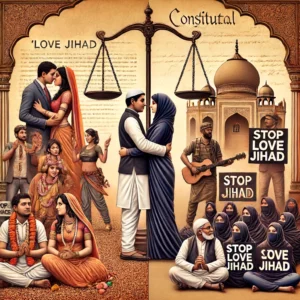“Love Jihad” Conspiracy Theory and Legal Implications
Overview: “Love Jihad” (or “Romeo Jihad”) is an Islamophobic conspiracy theory endorsed by right-wing Hindutva activists. It alleges that Muslim men systematically seduce Hindu women to convert them to Islam through deception, seduction, and marriage as part of a larger demographic strategy to dominate India. This theory is propagated by disinformation, portraying Muslims as barbaric and hypersexual, and depicting Hindu women as passive victims.
Origins and Spread: The theory originated around 2009 and was disseminated by Hindutva publications and groups like the Rashtriya Swayamsevak Sangh (RSS) and Vishva Hindu Parishad (VHP). The Bharatiya Janata Party (BJP), under Prime Minister Narendra Modi, institutionalized this concept, with significant contributions from media and social media disinformation campaigns.
Legislation and State Actions: Several BJP-ruled states, including Uttar Pradesh, Madhya Pradesh, Haryana, and Karnataka, have initiated or implemented laws to prevent “forced conversions” through marriage, colloquially termed as “Love Jihad” laws. These laws, such as the Prohibition of Unlawful Religious Conversion Ordinance, 2020 in Uttar Pradesh, penalize marriages intended to convert women to Islam, often leading to state repression of Muslims and crackdowns on interfaith marriages.
Impact and Violence: The conspiracy theory has incited vigilantism, assaults, and murders, including the 2013 Muzaffarnagar riots. It has also been adopted in Myanmar by the 969 Movement against Rohingya Muslims and among the non-Muslim Indian diaspora, forming alliances with Western far-right organizations.
Investigations and Legal Findings: Repeated investigations, including those by the National Investigation Agency (NIA) and the Karnataka CID, have found no evidence of an organized conspiracy or forced conversions related to “Love Jihad”. Nonetheless, the theory persists, influencing social and political dynamics and leading to legislative actions against interfaith marriages under the guise of protecting religious integrity.
Historical Context: The roots of the “Love Jihad” conspiracy trace back to the 1947 partition of India, which led to widespread reports of sexual predation and forced conversions. These historical tensions continue to shape cultural pressures against interfaith marriages in India.
Conclusion: “Love Jihad” remains a politically charged and socially divisive issue, fueled by disinformation and right-wing agendas. Despite lack of evidence, it has significantly impacted legal frameworks and social attitudes towards interfaith relationships in India and beyond.

1. Constitutional Provisions:
- Article 14 (Right to Equality): This article ensures equality before the law and equal protection of the laws to all individuals. Any law targeting a specific religion or interfaith marriage could be challenged as discriminatory under this provision.
- Article 15 (Prohibition of Discrimination): This article prohibits discrimination on grounds of religion, race, caste, sex, or place of birth. Any law or action that discriminates against individuals based on their religion in the context of marriage could be seen as a violation of this provision.
- Article 19 (Freedom of Speech and Expression): This article guarantees all citizens the right to freedom of speech and expression, which includes the right to express one’s choice in matters of marriage.
- Article 21 (Right to Life and Personal Liberty): This article guarantees the right to life and personal liberty, which includes the right to marry a person of one’s choice.
2. Indian Penal Code (IPC) Provisions:
- Section 153A (Promoting Enmity Between Different Groups): This section penalizes promoting enmity between different groups on grounds of religion, race, place of birth, residence, language, etc., and doing acts prejudicial to maintenance of harmony.
- Section 295A (Deliberate and Malicious Acts, Intended to Outrage Religious Feelings): This section penalizes deliberate and malicious acts intended to outrage religious feelings of any class by insulting its religion or religious beliefs.
- Section 498A (Husband or Relative of Husband of a Woman Subjecting Her to Cruelty): This section deals with the husband or relative of the husband of a woman who subjects her to cruelty, which can be used if there’s evidence of coercion or forceful conversion in a marriage.
- Section 506 (Punishment for Criminal Intimidation): This section penalizes criminal intimidation, which could be relevant if threats are used to coerce someone into marriage or conversion.
3. Specific State Legislation on “Love Jihad”: Several states in India have enacted specific laws addressing “Love Jihad.” These laws often focus on prohibiting religious conversions through marriage under certain conditions.
- Uttar Pradesh Prohibition of Unlawful Conversion of Religion Ordinance, 2020:
- This ordinance prohibits conversion of religion through misrepresentation, force, undue influence, coercion, allurement, or by any fraudulent means or by marriage.
- It requires individuals wishing to convert and those performing the conversion to submit a declaration to the district magistrate.
- Madhya Pradesh Freedom of Religion Act, 2021:
- Similar to the UP ordinance, it prohibits conversion through fraud, coercion, allurement, or marriage.
- Violations can result in imprisonment and fines. It also places the burden of proof on the person accused of conversion.
- Himachal Pradesh Freedom of Religion Act, 2019:
- This act requires prior notice of at least 30 days to the district magistrate before any conversion.
- It aims to prevent conversions by force, inducement, or fraudulent means.
4. Legal Challenges and Implications:
- These laws have faced criticism for potentially violating constitutional rights such as the right to privacy, the right to marry a person of one’s choice, and freedom of religion.
- Legal challenges have been made on grounds of these laws being discriminatory and infringing upon personal liberties guaranteed by the Constitution.
5. Enforcement and Judicial Review:
- Enforcement of these laws has led to several arrests and legal proceedings, often sparking debates on their constitutionality and implementation.
- Various High Courts and the Supreme Court of India have been involved in reviewing the legality of these provisions, balancing state interests with fundamental rights.
Conclusion: The legal framework around “Love Jihad” in India is complex, involving constitutional rights, IPC provisions, and specific state laws aimed at preventing forced conversions through marriage. These laws continue to evolve and face scrutiny to ensure they do not infringe upon fundamental rights while maintaining social order.
लव जिहाद (या रोमियो जिहाद) एक इस्लामोफोबिक साजिश सिद्धांत है जिसे दक्षिणपंथी हिंदुत्व कार्यकर्ताओं द्वारा प्रचारित किया गया है। इस साजिश सिद्धांत का दावा है कि मुस्लिम पुरुष हिंदू महिलाओं को इस्लाम में परिवर्तित करने के लिए उन्हें बहकाते हैं, प्रेम का दिखावा करते हैं, धोखा देते हैं, अपहरण करते हैं और शादी करते हैं। इसका मकसद मुसलमानों द्वारा भारत के खिलाफ एक व्यापक जनसांख्यिकीय “युद्ध” और अंतरराष्ट्रीय साजिश के हिस्से के रूप में जनसंख्या वृद्धि और प्रतिस्थापन के माध्यम से प्रभुत्व स्थापित करना है।
यह साजिश सिद्धांत झूठी जानकारी पर आधारित है और इसका उपयोग नफरत फैलाने वाले अभियानों के लिए किया गया है। यह मुसलमानों को बर्बर और अत्यधिक यौनवादी के रूप में चित्रित करता है और हिंदू महिलाओं को निष्क्रिय और पीड़ित दिखाता है, जबकि उनके प्रेम और पसंद के अधिकार को नजरअंदाज करता है। इसके परिणामस्वरूप, कई हमले, हत्याएं और हिंसक घटनाएं हुई हैं, जिनमें 2013 के मुजफ्फरनगर दंगे भी शामिल हैं।
2009 में शुरू हुए इस अभियान को हिंदुत्व प्रकाशनों और संगठनों ने फैलाया। राष्ट्रीय स्वयंसेवक संघ (आरएसएस) और विश्व हिंदू परिषद (वीएचपी) जैसे संगठनों ने इसे भारत और विदेशों में प्रचारित किया। 2014 तक उत्तर प्रदेश में इस पर विश्वास बढ़ गया और इससे भारतीय जनता पार्टी (बीजेपी) की चुनावी सफलता में योगदान मिला। प्रधानमंत्री नरेंद्र मोदी के नेतृत्व में बीजेपी के चुनाव के बाद यह अवधारणा संस्थागत रूप से मान्यता प्राप्त हुई।
प्रो-सरकारी मीडिया और सोशल मीडिया अभियानों ने इसकी लोकप्रियता बढ़ाने में भूमिका निभाई। उत्तर प्रदेश में योगी आदित्यनाथ की सरकार ने इसके खिलाफ कानून भी लागू किया, जो अंतरधार्मिक विवाहों पर नकेल कसने का साधन बन गया। इस साजिश सिद्धांत को म्यांमार में भी अपनाया गया, जहां इसे बौद्ध महिलाओं के इस्लामीकरण का आरोप लगाकर रोहिंग्या नागरिकों के खिलाफ सैन्य कार्रवाइयों का औचित्य ठहराने के लिए इस्तेमाल किया गया।
इस साजिश सिद्धांत ने गैर-मुस्लिम भारतीय प्रवासी समुदायों में भी विस्तार किया और हिंदुत्व समूहों और पश्चिमी अतिदक्षिणपंथी संगठनों के बीच गठबंधन का कारण बना। इसे केरल के कैथोलिक चर्च द्वारा भी अपनाया गया है ताकि ईसाईयों के बीच अंतरधार्मिक विवाह को हतोत्साहित किया जा सके।
इस सिद्धांत की तुलना ऐतिहासिक नफरत अभियानों और समकालीन श्वेत राष्ट्रवादी साजिश सिद्धांतों से की जाती है। यह हिंसा और सामाजिक अशांति का कारण बना है, और इसके परिणामस्वरूप कई निर्दोष लोग प्रभावित हुए हैं।
Author: lex 24
Mr. Shiva Kant Vats, Advocate A distinguished advocate practicing at the Supreme Court of India and a business consultant. He provides expert guidance to a wide range of clients. Deeply interested in India's history and cultural heritage, he is dedicated to exploring and reviving the ancient wisdom of the Vedic Rishi tradition. We frequently invokes the timeless Vedic prayers: "असतो मा सद्गमय" (Lead me from untruth to truth) "तमसो मा ज्योतिर्गमय" (Lead me from darkness to light) "मृत्यो मा अमृतंर्गमय" (Lead me from death to immortality) We emphasizes continued relevance in today's world. The envisions reviving and upholding the glorious traditions of the Vedic Rishi culture, asserting that each individual can contribute to global welfare through relentless effort. We passionately believes that rekindling this ancient tradition is possible in modern times and foresees a revolutionary transformation worldwide. In our call to action, we urges readers to transcend geographical boundaries and illuminate the world with the guiding light of humanity. We encourages everyone to read his works, engage with our ideas through likes, comments, and shares, and foster meaningful dialogue beyond mere digital interactions. In an era dominated by technology, we reminds the paramount importance of genuine friendships and human connections....




